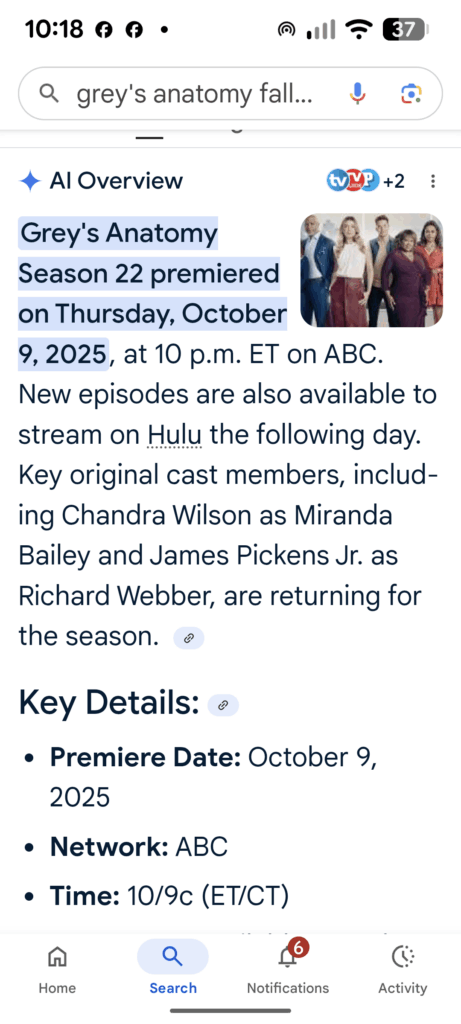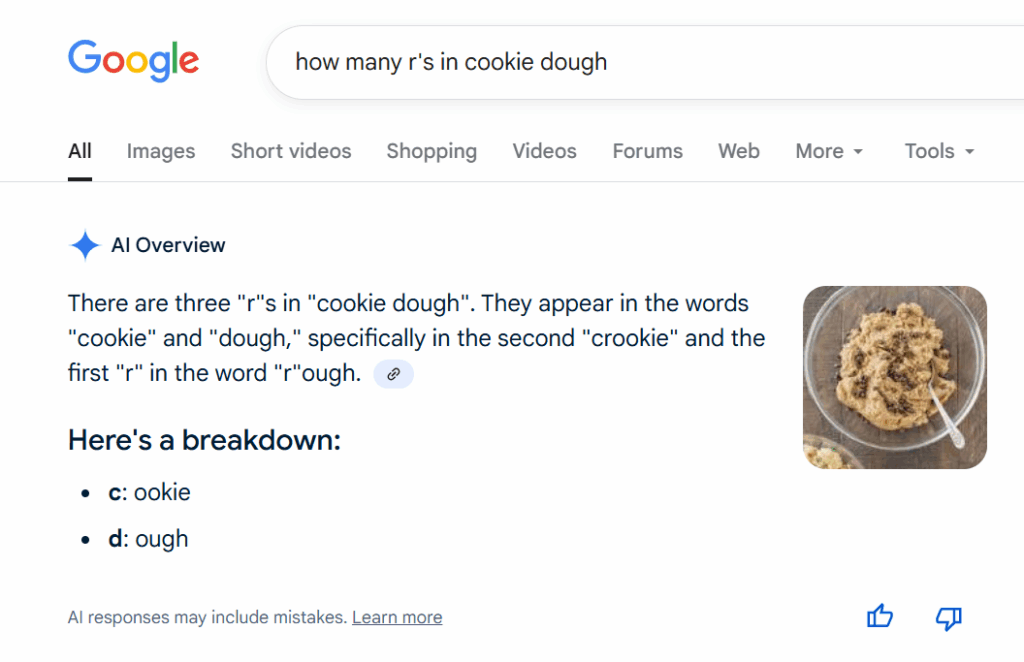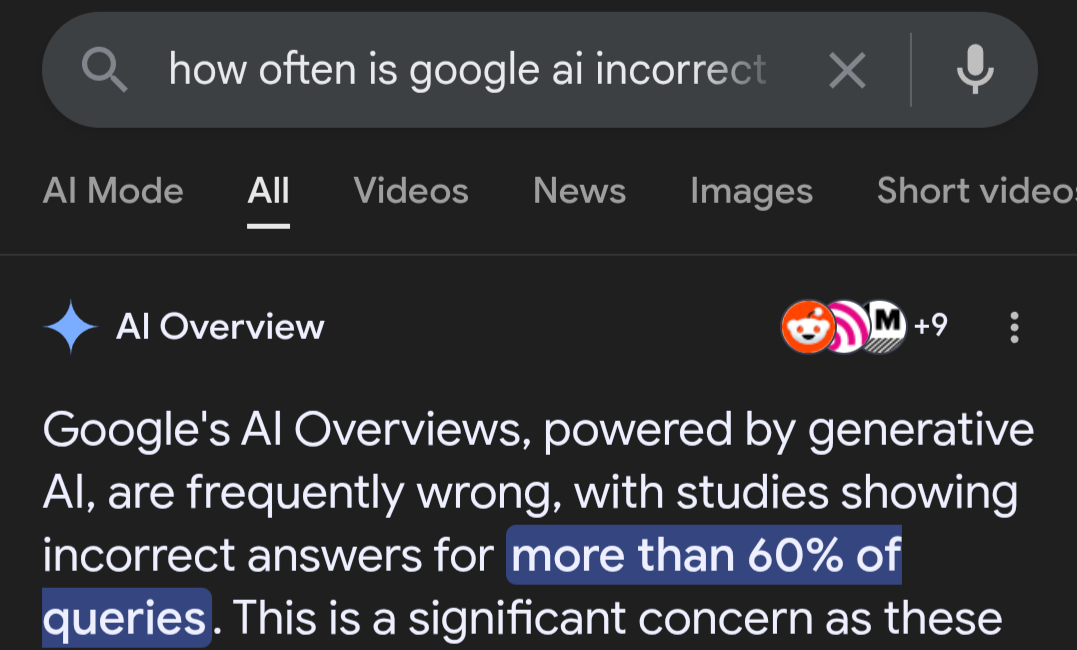Copy, Paste, Regret: Why it’s Important to Verify AI Content
We all love how fast AI can give us answers and content. You ask it a question and it gives you a polished response in seconds! But beware, because that speed comes with a hidden cost: a confident sounding answer that may just not be true. AI doesn’t know anything, it “predicts” things. And sometimes these predictions sound so authoritative that even what should be an obvious error can slip right past us if we’re not careful.
That’s how small mistakes like a wrong verb tense or an invented, hallucinatory “fact” can end up in your marketing, on your website, or in customer communications. While a few of these errors might just earn a giggle – there’s an entire subreddit called “aifails” that’s good for some laughs – others can do serious damage to your business.
AI Fails Can Be Funny
A few days before the fall TV season kicked off, I asked when long-running show “Grey’s Anatomy” would resume for the fall season. The AI confidently told me the season had “premiered” on October 9, 2025: three days in the future from when I asked the question. The date was right, but the tense was wrong. It’s a small mistake, but it’s one that instantly shows an inherent flaw in AI answers and writing. If I had copied that into a blog post, readers would either think we were mindlessly using AI without verification or that we didn’t know how calendars work.
Another user asked Google how many “R’s” are in cookie dough. Google’s AI cheerfully informed them that there were three, and even explained where they supposedly appeared: in the word “crookie” and the “r” in “r”ough.” There are of course no R’s in the words “cookie dough.” But here the answer is, presented with total confidence with bullet points and a strange explanation.
These are ostensibly funny examples. But sometimes, the consequences aren’t funny at all.


The Stakes Get Higher
In early 2024, Air Canada learned this lesson the hard way. A customer used the company’s website chatbot to ask about refunds for bereavement fares. The chatbot told him something that wasn’t true: that he could apply for the refund after purchasing and get it later. The airline denied his refund request, so he took them to a tribunal and won.
The court ruled that the incorrect information given by the AI chatbot was Air Canada’s responsibility. They couldn’t simply blame the mistake on the AI and walk away. In other words, if your company publishes it, even through an automated system, it’s still your word. That case set a clear legal precedent: automation does not erase your accountability.
For business owners and marketers like Wild Iris, that really matters. Whether it’s a chatbot, website content, a blog, or a social media post, every word reflects on your brand. The difference between building trust and finding embarrassment is often just one unchecked “fact” or bit of text.
Why AI Fails Happen
When we say AI “predicts,” we don’t mean it can see the future. For AI, prediction means estimating the next most likely word in a sentence based on patterns it’s seen before. It’s not recalling facts from memory, it’s performing advanced autocomplete on a huge scale; similar to the autocorrect in your texting, and we all know how that goes! The AI model has no sense of truth or time; it’s simply choosing the most statistically probable combination of words. That’s why it can sometimes sound so right while being so very wrong.
AI isn’t trying to lie to you, it’s trying to guess the answer you asked for. It’s trained to predict what words look “right” together, not to verify facts or check dates. That’s why it may describe a future event as if it already happened or confidently add a letter in words where that letter does not exist. It writes smooth sentences, not necessarily true ones.
Even AI systems that just pull information from the web can get confused. They might combine sources, summarize speculation, or mix up tenses just to sound definitive. The result may feel polished and persuasive, but it may be completely wrong.
Why It Matters
One small error can quickly erode trust. An incorrect fact in a blog or email can make your customers and readers second-guess the rest of your message. And if that same error gets republished in your newsletter or reposted on social media, it can spread fast. And consistent factual mistakes can chip away at your credibility with not only people but also search engines.
As Air Canada showed, there’s also more at stake than just your reputation. Companies are increasingly being held legally responsible for what their AI tools say. That means every AI-generated bit of content from a chatbot, a marketing email, or website page should have a human verify it’s accurate before it goes live.
Keep AI Honest
You don’t have to stop using AI, nor should you! Just slow down a bit. Verify its information. A few good habits can make a significant difference:
- Double-check dates and verb tense on anything time-sensitive.
- Look for citations on numbers, names, and claims that you aren’t already certain are true.
- Find at least one reliable source for anything factual.
- Add an “As of this date” for information that might change.
- Make sure details like hours, pricing, or events are kept updated.
You don’t need to be perfect, but you do need to understand that you can be held accountable for what you put out there. When you post what AI tells you, readers assume you are saying it’s true. In the same way you should never post what you or a team member writes without proofreading, don’t just post what AI writes without confirming it first.
Don’t Trust, Just Verify
AI is an incredible tool you can use for creativity and efficiency. But it’s not an editor, a journalist, or a fact-checker. It can’t tell the difference between something that sounds true and something that is true. That’s still our job as humans.
Take the extra minute to verify the information AI writes or gives you. I might just save your company from embarrassment, or more importantly, from serious liability. Use AI for what it’s good at: helping you work faster. But always make sure it’s right before you share it with the public!
Need Help Keeping Your Content Trustworthy?
At Wild Iris Marketing, we use AI the right way. We pair it with real human oversight! We fact-check, proofread, and edit every bit of content before we make it live, so your brand earns trust instead of risking it. If you’re ready for smart marketing that moves fast and stays accurate, get in touch today!


